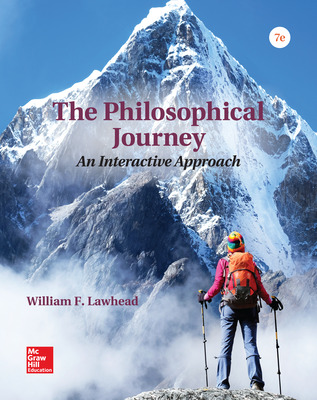Description
Test Bank For The Philosophical Journey An Interactive Approach 7TH Edition By William Lawhead
The Philosophical Journey: An Interactive Approach, 7e
CHAPTER 1: Introduction to the Philosophical Journey
CHAPTER 2: The Search for Ultimate Reality
CHAPTER 3: The Search for Knowledge
CHAPTER 4: The Search for God
CHAPTER 5: The Search for Ethical Values
CHAPTER 6: The Search for the Just Society
CHAPTER 7: Philosophy and the Meaning of Life
The Philosophical Journey: An Interactive Approach, 7e (Lawhead)
Chapter 2 The Search for Ultimate Reality
1) Philosophical questions about the nature of reality fall under the heading of metaphysics.
Answer: TRUE
Accessibility: Keyboard Navigation
2) According to your text, a metaphysical idealist is a person who is very optimistic.
Answer: FALSE
Accessibility: Keyboard Navigation
3) Metaphysical materialism is a form of dualism.
Answer: FALSE
Accessibility: Keyboard Navigation
4) Your text said that fundamental reality is that upon which everything else depends.
Answer: TRUE
Accessibility: Keyboard Navigation
5) Hugh Elliot’s story of “Tantalus” was meant to illustrate the fact that thoughts are the product of a nonphysical mind.
Answer: FALSE
Accessibility: Keyboard Navigation
6) Descartes’s position on the mind-body issue is a form of metaphysical dualism.
Answer: TRUE
Accessibility: Keyboard Navigation
7) René Descartes was more certain about the existence of his mind than the existence of his body.
Answer: TRUE
Accessibility: Keyboard Navigation
8) Descartes believed that the mind and body interact in the pineal gland.
Answer: TRUE
Accessibility: Keyboard Navigation
9) David Chalmers argued that physicalism is false.
Answer: TRUE
Accessibility: Keyboard Navigation
10) According to your text, the principle of Ockham’s razor lends support to the dualist.
Answer: FALSE
Accessibility: Keyboard Navigation
11) In Jeffrey Olen’s story about the watch, the people who thought a gremlin caused the watch to move represent mind-body interactionists.
Answer: TRUE
Accessibility: Keyboard Navigation
12) Identity theory claims that the mind is identical to a nonphysical substance that is separate from the brain.
Answer: FALSE
Accessibility: Keyboard Navigation
13) The functionalist denies that mental states are necessarily identical to brain states.
Answer: TRUE
Accessibility: Keyboard Navigation
14) The functionalist denies that mental states can function as the causes of behavior.
Answer: FALSE
Accessibility: Keyboard Navigation
15) The position of functionalism is incompatible with the strong artificial intelligence position.
Answer: FALSE
Accessibility: Keyboard Navigation
16) René Descartes believed that someday machines would become intelligent.
Answer: FALSE
Accessibility: Keyboard Navigation
17) Descartes argued that understanding language can be used as a criterion for identifying genuine intelligence.
Answer: TRUE
Accessibility: Keyboard Navigation
18) The strong AI thesis claims that it is possible for a computer to have cognitive states.
Answer: TRUE
Accessibility: Keyboard Navigation
19) John Searle’s Chinese room argument attempted to refute physicalism.
Answer: FALSE
Accessibility: Keyboard Navigation
20) Searle maintained that there is a difference between simulating cognition and duplicating it.
Answer: TRUE
Accessibility: Keyboard Navigation
21) The libertarian rejects the thesis of universal causation.
Answer: TRUE
Accessibility: Keyboard Navigation
22) The hard determinist and the libertarian both agree that if our choices are inevitable, then there is no moral responsibility.
Answer: TRUE
Accessibility: Keyboard Navigation
23) The hard determinists are claiming that only their behavior is determined, but they are making no claims about your behavior.
Answer: FALSE
Accessibility: Keyboard Navigation
24) The compatibilist claims that we are not 100% determined in our behavior.
Answer: FALSE
Accessibility: Keyboard Navigation
25) The compatibilist claims that your desires, values, and motives play no role in explaining your behavior.
Answer: FALSE
Accessibility: Keyboard Navigation
26) The compatibilist differs with the hard determinist over whether or not any of our actions can meaningfully be said to be free.
Answer: TRUE
Accessibility: Keyboard Navigation
27) The libertarian would agree with the compatibilist on the definition of “free actions.”
Answer: FALSE
Accessibility: Keyboard Navigation
28) Some determinists believe that it is God who determines all events.
Answer: TRUE
Accessibility: Keyboard Navigation
29) All determinists believe that everything that happens in the world is the result of a benevolent, purposeful plan.
Answer: FALSE
Accessibility: Keyboard Navigation
30) The determinist believes that your actions would be perfectly predictable if one knew all the causes acting upon you.
Answer: TRUE
Accessibility: Keyboard Navigation
31) According to agency theory, event-causation describes events that are determined.
Answer: TRUE
Accessibility: Keyboard Navigation
32) Richard Taylor’s agency theory is a form of libertarianism.
Answer: TRUE
Accessibility: Keyboard Navigation
33) To be a libertarian, one must deny that human actions are ever the result of previous causes.
Answer: FALSE
Accessibility: Keyboard Navigation
34) Jean-Paul Sartre’s claim that “existence precedes essence” means that who we are is what nature made us to be.
Answer: FALSE
Accessibility: Keyboard Navigation
35) According to Sartre, “transcendence” refers to the fact that our lives are defined by the possibilities we face and the choices we make.
Answer: TRUE
Accessibility: Keyboard Navigation
36) The compatibilist claims that a voluntary action is one which lacks determining causes.
Answer: FALSE
Accessibility: Keyboard Navigation
37) According to the compatibilist, we cannot be morally responsible for actions which are determined.
Answer: FALSE
Accessibility: Keyboard Navigation
38) Which of the following metaphysical issues was/were addressed by the ancient Greek philosophers?
A) the problem of permanence and change
B) the problem of appearance and reality
C) the nature of the self
D) all of the above.
Answer: D
Accessibility: Keyboard Navigation
39) The two kinds of monism are
A) atheism and theism.
B) materialism and idealism.
C) empiricism and rationalism.
D) freedom and determinism.
Answer: B
Accessibility: Keyboard Navigation





Be the first to review “Test Bank For The Philosophical Journey An Interactive Approach 7TH Edition By William Lawhead”